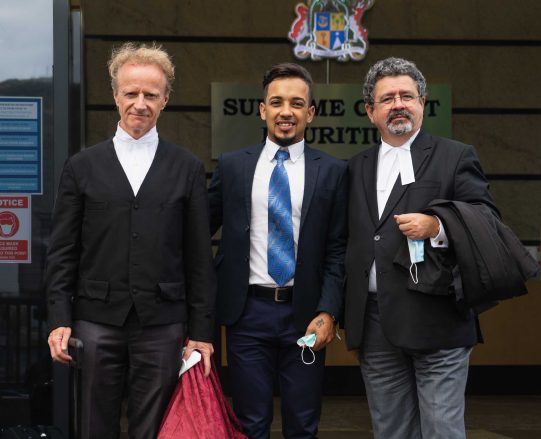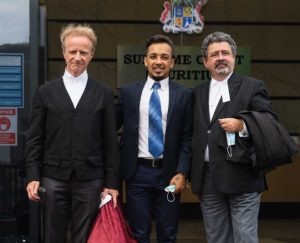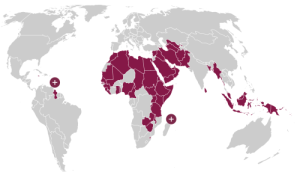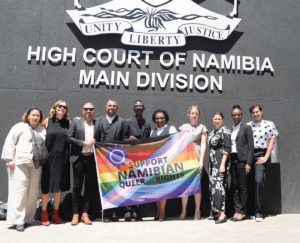| CASE NAME | Abdool Ridwan Firaas Ah Seek v. State of Mauritius (2023) |
| COUNTRY | Mauritius |
| COURT / TRIBUNAL | The Supreme Court of Mauritius |
| STATUS | Judgment delivered on 04 October 2023 |
Summary
Section 250 of the Mauritian Criminal Code criminalises ‘sodomy’, and anyone convicted could face a maximum penalty of five years’ imprisonment. In 2019, Abdool Ridwan (Ryan) Firaas Ah Seek filed a legal challenge to the Supreme Court of Mauritius challenging the constitutionality of Section 250 of the Criminal Code. Additionally, the Collectif-Arc-en-Ciel, a local LGBT rights organisation, was an interested party in this case. The case was heard in November 2021, and judgment was released on 04 October 2023. The Supreme Court declared Section 250 unconstitutional and discriminatory to the extent it criminalises consensual sexual acts between adult males in private.
Case Details
Male same-sex sexual activity was prohibited under the Criminal Code 1898, which criminalised acts of ‘sodomy’. This provision carries a maximum penalty of five years’ imprisonment. The law was inherited from the British rule during the colonial period, in which the English criminal law was imposed upon Mauritius. Mauritius retained the provision upon independence. Section 250 enabled the police to enter suspected offenders’ premises on the mere suspicion they may be engaged in consensual male same-sex activity in private, and to conduct intrusive searches.
There is no evidence of the law being enforced for many years in cases of consensual same-sex sexual activity, and it appeared to be largely obsolete in practice. Nevertheless, the mere existence of this provision was itself a violation of human rights and underpinned further acts of discrimination (see further). There have been some reports of discrimination and violence being committed against LGBT people in recent years, however reporting is limited due to the fear of ostracisation and reprisal.
The case was brought to establish that the offence is incompatible with various rights protected by the Constitution of Mauritius.
The Parties
The Claimant was Abdool Ridwan (Ryan) Firaas Ah Seek, a gay Mauritian man and LGBT activist who sought to establish the unconstitutionality of Section 250 of the Criminal Code. He had been living in a same-sex relationship with his partner for 10 years and had been in fear of being arrested under Section 250 of the Criminal Code for simply living and embracing his sexuality. He was joined by the Collectif-Arc-en-Ciel as an interested party, the largest and longest-standing organisation in Mauritius championing the human rights of LGBT people. The Director of Public Prosecutions also joined the case as an interested party. The Defendant was the State of Mauritius.
Applicable Law
Mr Ah Seek argued that Section 250 is in violation of the following rights contained in the Constitution of Mauritius:
| RIGHTS | PROVISIONS |
| Right to protection against inhuman and degrading treatment | Section 7 |
| Right to liberty | Section 5 |
| Right to privacy | Section 9 |
| Freedom of expression | Section 12 |
| Freedom of assembly and association | Section 13 |
| Right to protection against discrimination | Section 16 |
Relief Sought
The Claimant sought a declaration that Section 250 of the Criminal Code is unconstitutional and in violation of various provisions of the Constitution, and be struck down to the extent of that inconsistency. Alternatively, the Claimant sought a declaration that Section 250 be declared unconstitutional and in violation of various provisions of the Constitution to the extent it prohibits consensual and private sexual acts between male adults, and for Section 250 to be read as excluding such acts from its scope.
Decision
The Supreme Court declared Section 250 of the Criminal Code unconstitutional to the extent it criminalises consensual sexual acts between adult males in private and declared that Section 250 should be read so as to exclude such acts from being encompassed by the section. The Court reached this conclusion on the basis that Section 250 of the Criminal Code violates Section 16 of the Constitution, which provides for protection from discrimination on the grounds of sex. Drawing on international and comparative human rights jurisprudence, the Court interpreted the word “sex” in Section 16 of the Constitution to include “sexual orientation”.
This approach is consistent with analogous cases from other commonwealth jurisdictions and Mauritius’ obligations under the International Covenant on Civil and Political Rights, which the Court considered as relevant and persuasive in its interpretation. The Court stated that international treaty obligations must inform the interpretation of Constitutional rights.
Having held that Section 16 of the Constitution included “sexual orientation”, the Court found Section 250 to be discriminatory. It stated that there was no legitimate State interest such as national security or other public interests which could justify this differential treatment of same-sex activity. It thus declared Section 250 unconstitutional in so far as it criminalised consensual sexual activity between male adults. Having made this finding, the Court did not view it necessary to examine the alleged breaches of the other rights asserted by the Claimant.
The Human Dignity Trust’s Role
The Claimant was represented by a Mauritian legal team composed of Gavin Glover SC, Yanilla Moonshiram, barrister-at-law, and Komadhi Mardemootoo, attorney-at-law, with support from the Human Dignity Trust, Tim Otty KC (founder of the Human Dignity Trust), Isabel Buchanan and international law firm Herbert Smith Freehills. The Human Dignity Trust also supported the Collectif Arc-en-Ciel in this landmark case.




